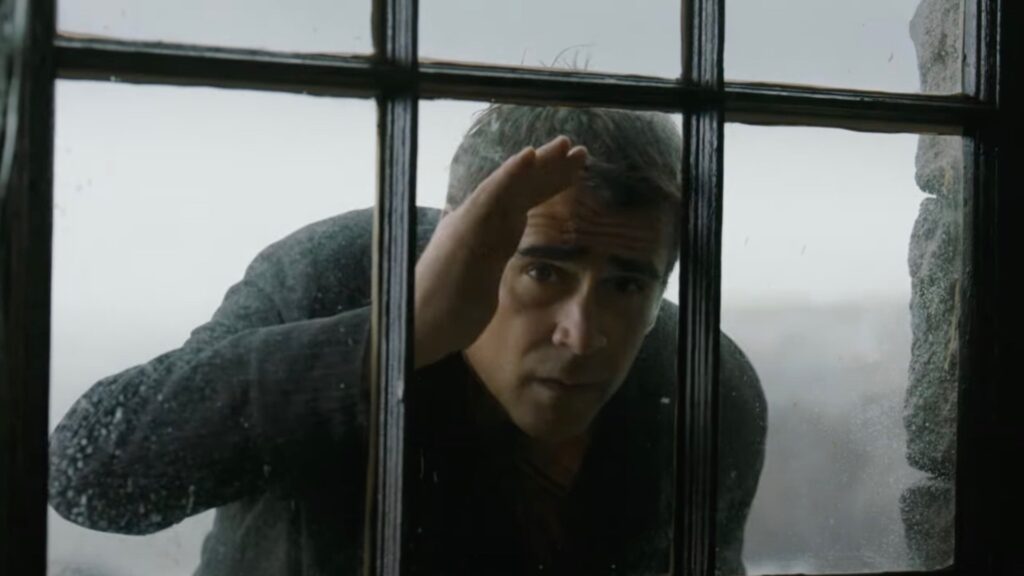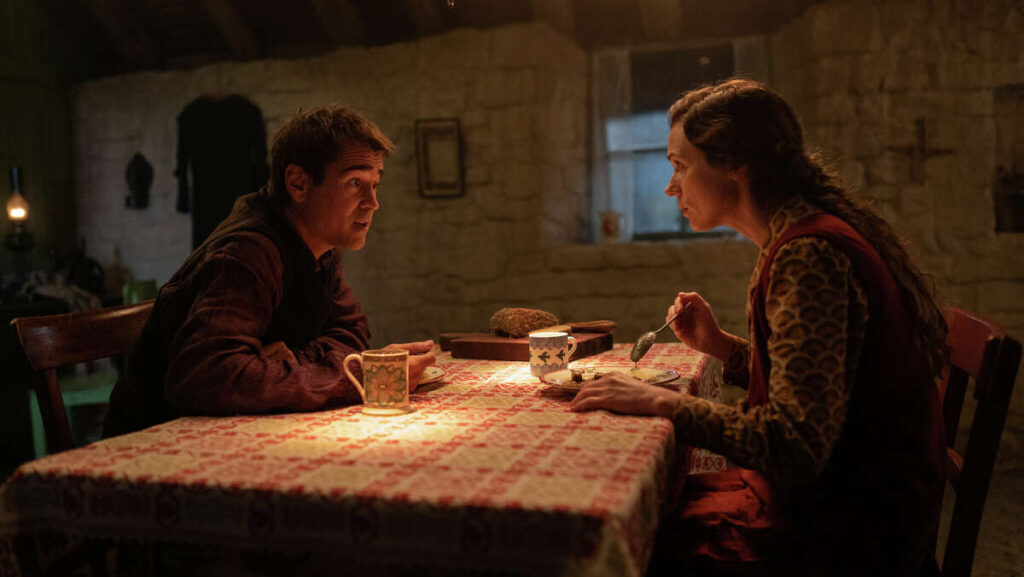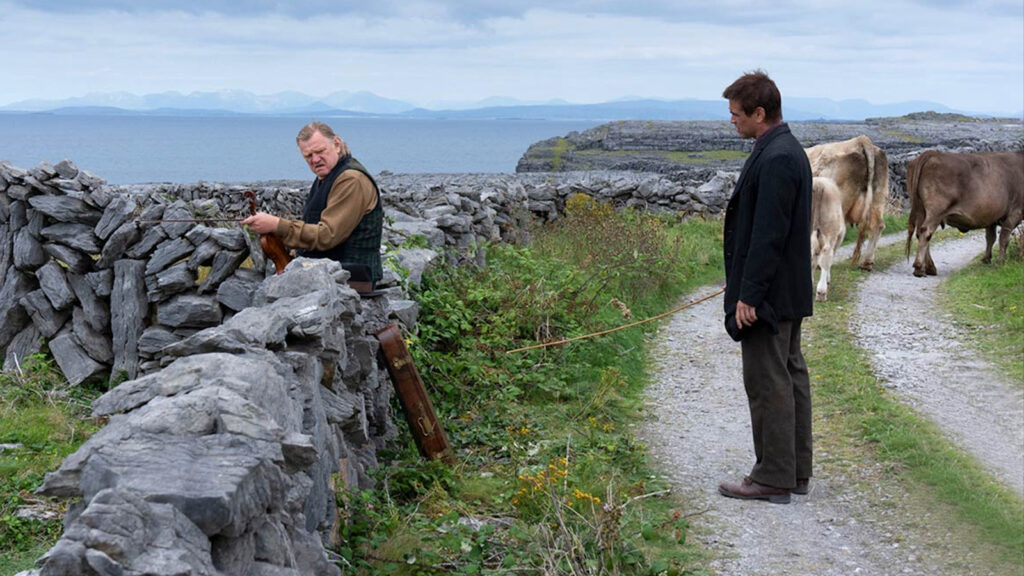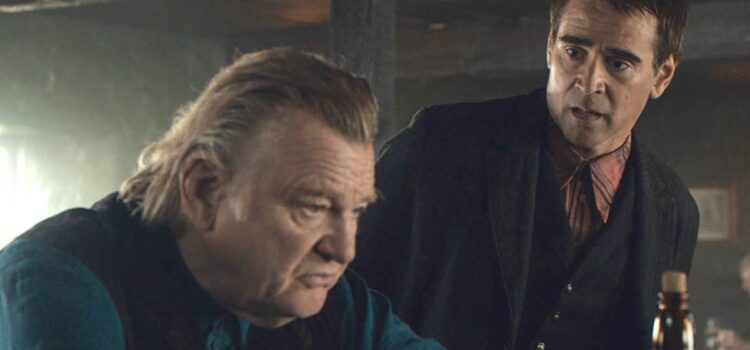By Alex McPherson
A tragicomedy that packs a massive emotional wallop, writer-director Martin McDonagh’s “The Banshees of Inisherin” is a near-perfect film, balancing its blisteringly entertaining dialogue with sobering pathos. As someone who considers “Three Billboards Outside Ebbing, Missouri” to be one of my favorite films of all time, McDonagh’s latest effort certainly doesn’t disappoint.
Set on an idyllic island off the west coast of Ireland in 1923 — shielded from the nearby civil war, yet remaining its own microcosm of turmoil and pettiness — “The Banshees of Inisherin” follows Pádraic (Colin Farrell), an contented, amiable dairy farmer who makes up for his lack of sophistication with kindness. Living in a cottage with his loving sister Siobhan (Kerry Condon) and his beloved donkey Jenny, Pádraic is comfortable with his banal existence. Until, one day, there is a disturbance in the force.
Pádraic usually jaunts off to the local pub mid afternoon with his aging pal, Colm (Brendan Gleeson), but on this day in April when Pádraic stops by to meet Colm at his house, he’s completely ignored. In fact, Colm wants absolutely nothing to do with Pádraic anymore, declaring him, bluntly, to be too boring and dull to be worth hanging out with. Colm, suffering from “despair,” wants to leave a mark on the world through composing music, and is prepared to cut out anything that could possibly hold him back. Pádraic is utterly distraught, unwilling to accept Colm’s decision — which sets the stage for a typically McDonagh-esque comedy of errors, steeped with brutality, both physical and verbal, and leaving a tangibly potent impact.
Indeed, “The Banshees of Inisherin” blends hilarity with calamity, exaggeration with resonant, relevant themes. McDonagh explores the perils of ego, mental illness, isolation, mortality, and civil conflict with panache, imbuing the film with unpredictability from start to finish.

The cast is stellar, especially the two leads, finally reuniting after “In Bruges.” Farrell brings yet another fascinatingly flawed character to life as Pádraic experiences a loss of innocence and of self amid the increasingly chaotic proceedings. While the initial setup is played for laughs, McDonagh understands the pain that Colm’s actions wreak upon Pádraic’s well-being — every sardonic quip and blunt takedown is tinged with melancholy. Farrell, as usual, gives a masterful performance, conveying deep wells of feeling through facial expressions alone.
Pádraic’s a sympathetic protagonist, despite his refusal to leave Colm alone. He wants to live a “simple” life and finds joy in the little things, like relaxing at the pub (essentially the town hall), and caring for Jenny. Colm’s actions, however, send him spiraling further and further from the person he thought he was, inching ever-closer to the despair that grips Colm’s soul, as tensions continue to escalate.
Colm’s motivations, despite his stubbornness, remain understandable. Gleeson, with a weathered visage and stern demeanor, lends sorrow to the character. Colm is experiencing an existential crisis, making a last-minute scramble to leave behind a legacy and become one of the greats, like Mozart (even though Pádraic’s never heard of him). His seemingly small actions have profound effects throughout the community, and his harsh decisions are rooted in self-loathing and misplaced pride.
This being a McDonagh joint, supporting players are given plenty of depth. Condon is superb as Pádraic’s sister, Siobhan, the wisest in the village who recognizes Colm’s absurd behavior, and struggles to rescue her brother from sinking to his lows. Wry, intelligent, and underestimated, Siobhan has a fantastic arc over the course of the film, and features in some of its most stirring sequences. Barry Keoghan is incredible as a foul-mouthed young man named Dominic — offbeat, enduring an abusive household with his sadistic policeman father, Peadar (Gary Lydon), yet searching for meaning, purpose, and belonging. Sheila Flitton is fittingly creepy as Mrs. McCormick, embodying a wiry old “banshee” who might, or might not, have some supernatural pull over the island — foretelling doom with a smirk. Who knows, maybe she just likes toying with people?

Oh, did I forget to mention that this film is funny? McDonagh’s screenplay keeps viewers on their toes, mixing earnest and sardonic, even cartoonish dialogue to thrilling effect. Particularly amusing is how wildly out-of-hand the whole situation gets. “The Banshees of Inisherin” walks a thin narrative tightrope — with over-the-top plot developments that segue into violence, tragedy, and reflection — but through it all, McDonagh ensures we’re in good hands.
The story and performances are the film’s main appeal, but “The Banshees of Inisherin” also shines stylistically. Ben Davis’ vibrant, lush cinematography captures the beauty of this fictional town, but paints a wryly misleading picture, as does Carter Burwell’s wistful score. The camera often frames Pádraic separated from Colm through doors and windows, highlighting the metaphorical chasm between them. Outside, the rolling green hills and bright sun belie an isolation that permeates the island’s residents.
For while a war rages across the mainland — neighbor against neighbor, friend against friend — a different, albeit not so different conflict ensues on Inisherin, between two friends questioning what’s truly important in life. “The Banshees of Inisherin” is, quite simply, unmissable, although viewers should be aware that it isn’t a traditional comedy in any sense of the word. It’s quite a wrenching ride at times, but one of 2022’s best.
“The Banshees of Inisherin” is a 2022 comedy-drama written and directed by Martin McDonagh starring Colin Farrell, Brendan Gleeson, Kerry Condon and Barry Keoghan. It’s rated R for language throughout, some violent content and brief graphic nudity, and the run time is 1 hour, 49 minutes. It is in local theaters Nov. 4. Alex’s Grade: A+

Alex McPherson is an unabashed pop culture nerd and a member of the St. Louis Film Critics Association.

